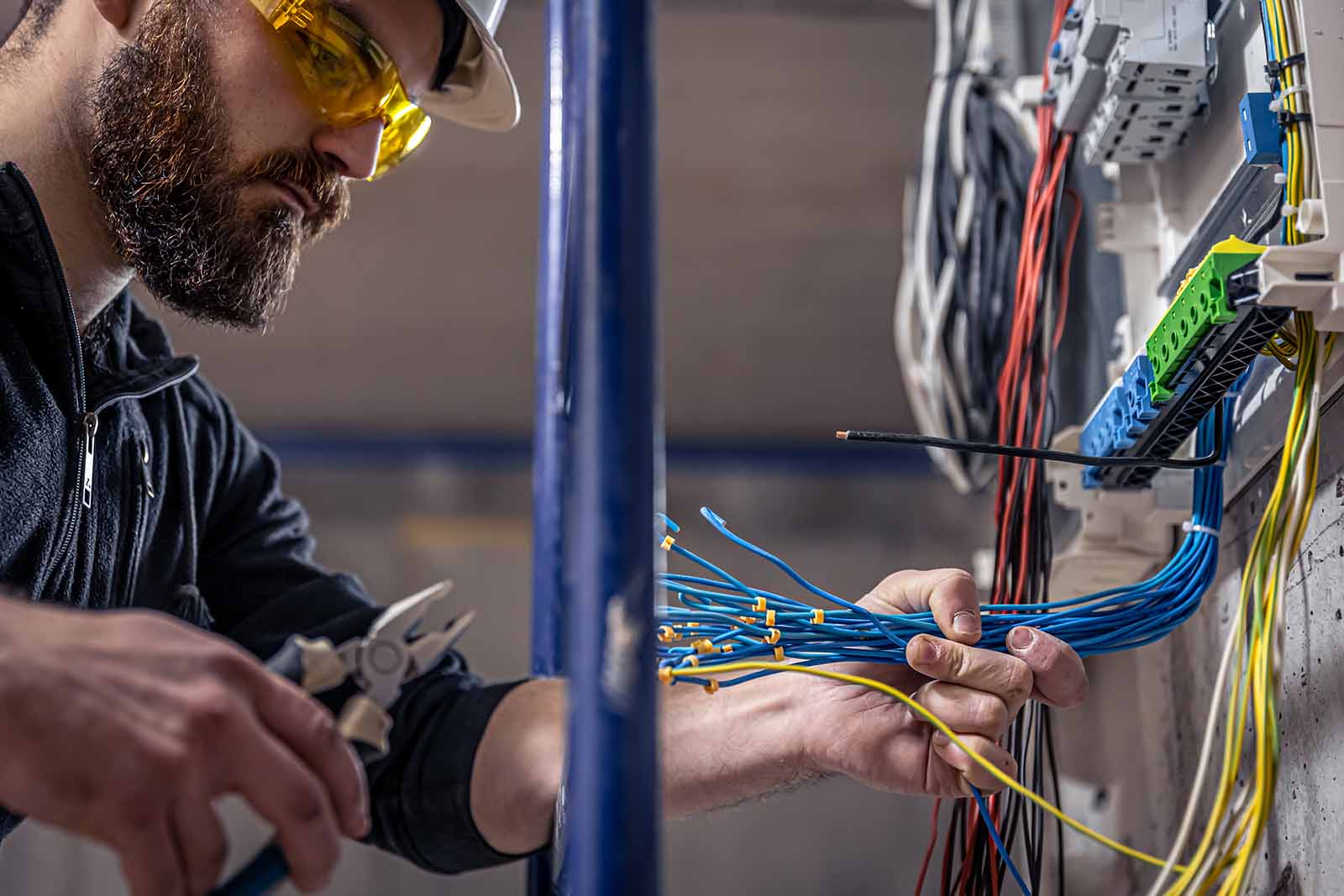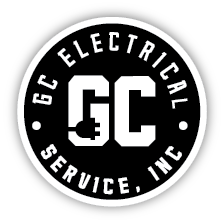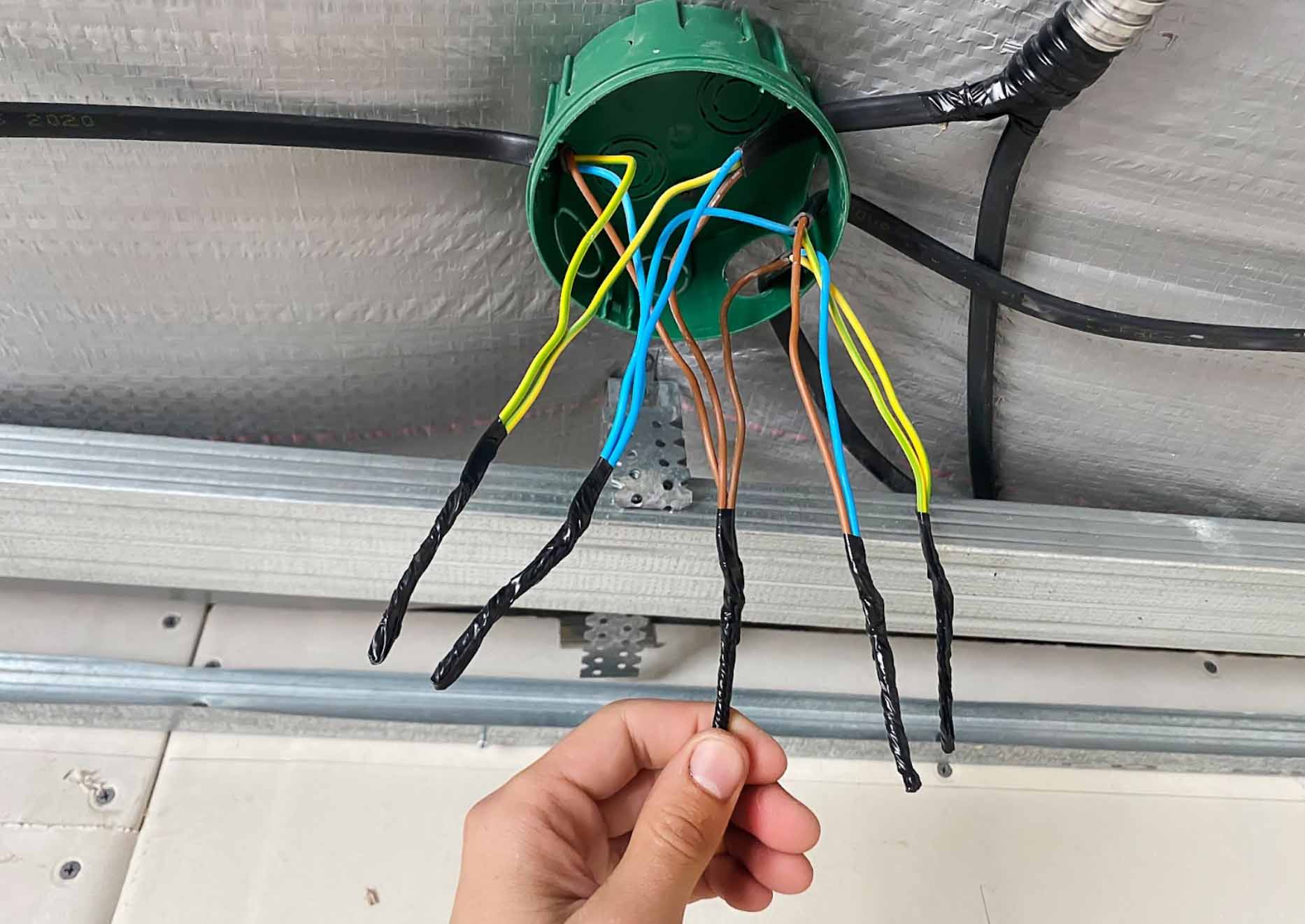As our homes age, their electrical systems can become outdated and potentially hazardous. Rewiring a house is a comprehensive solution to enhance safety, improve energy efficiency, and accommodate new technology. Whether planning a complete renovation or addressing specific electrical issues, understanding the rewiring process is essential. Updating your home's wiring system is crucial in maintaining safety and functionality, especially in older houses. Let's learn what to expect when rewiring your home, from initial planning to the final inspection.
Understanding Rewiring and Its Importance
Rewiring a house involves replacing the existing electrical wiring to ensure it meets current security standards and can handle the electrical load of modern appliances and devices. This process is crucial for several reasons: safety, efficiency, and the capacity to support contemporary technology. Here’s a closer look at what rewiring entails and why it’s essential.
What is Rewiring?
Installing new wires, outlets, switches, and circuit breakers replaces the outdated wiring in a house. Upgrading the electrical panel and ensuring all wiring conforms with the most recent electrical codes and regulations are possible additional steps in this process. Depending on the condition and age of the existing electrical system, rewiring can be a partial project, focusing on specific areas of the home or a complete overhaul.
Importance of Rewiring
Rewiring a home is a crucial undertaking that addresses both safety and functionality. Electrical systems can become outdated and potentially hazardous as they age, making rewiring essential for modern living. Below are the benefits of practicing correctly rewiring for your home:
-
-
Enhancing Safety
One primary reason for rewiring is to enhance the safety of your home. Older wiring systems can deteriorate, leading to exposed wires, frayed insulation, and other hazards that increase the risk of electrical fires. Modern wiring materials and techniques are designed to prevent such issues, providing a safer environment for your household. -
Meeting Electrical Demands
Due to the proliferation of electronic devices and appliances, today’s homes require more electricity than ever before. Old wiring systems may be unable to handle this increased load, leading to frequent circuit breaker trips, flickering lights, and other signs of an overloaded system. Rewiring ensures that your electrical system can meet current and future demands without compromising performance or safety. -
Increasing Home Value
Updating the electrical system can significantly increase the value of your home. Potential buyers view modern wiring as a major selling point, as it eliminates the need for immediate upgrades and reduces the risk of electrical problems. A newly rewired home is often more attractive to buyers, making it a worthwhile investment if you plan to sell your property. -
Compliance With Building Codes
Electrical codes and regulations are updated regularly to reflect new safety standards and technological advancements. Rewiring ensures that your home’s electrical system complies with the latest codes, essential for passing inspections and obtaining necessary permits for renovations or additions. Compliance with these standards improves safety and protects you from potential legal and financial liabilities. -
Improving Energy Efficiency
Modern wiring systems are designed to be more energy-efficient, reducing power loss and lowering electricity bills. By rewiring your home, you can take advantage of these improvements, ensuring that your electrical system operates more efficiently and cost-effectively. Energy-efficient wiring also contributes to a more environmentally friendly home by reducing energy consumption.
-
The Essential Role of Rewiring
Rewiring your home is critical in ensuring safety, meeting electrical demands, increasing property value, complying with building codes, and improving energy efficiency. Homeowners can make informed decisions and prepare for a successful rewiring project by understanding what rewiring entails and recognizing its importance. Investing in a modern electrical system enhances the functionality and safety of your home and provides peace of mind for years to come.
Ten Things to Know Before Rewiring a House
Rewiring a house is a significant project that requires careful planning and consideration. Before starting this essential home improvement task, here are ten crucial things to know.
-
Assess the Current Wiring
Before starting a rewiring project, it's crucial to assess the condition of your existing wiring. Look for signs of wear and tear, such as frayed wires, outdated materials, and frequent electrical issues. A professional electrician can conduct a thorough inspection to determine the extent of the rewiring needed. -
Plan the Layout
Planning the new wiring layout is essential to meet your current and future needs. Consider the placement of outlets, switches, and lighting fixtures. Think about how you use each room and plan accordingly to accommodate all your electrical devices and appliances. -
Understand the Costs
Rewiring a house can be expensive, so it's essential to understand the costs involved. The price can vary depending on your home's size, the job's complexity, and the materials used. Obtain multiple quotes from licensed electricians to get a realistic estimate and budget accordingly. -
Hire a Licensed Electrician
Rewiring a house is not a DIY project. It requires the expertise of a licensed electrician familiar with local building codes and safety standards. Ensure that the electrician you hire has the qualifications, experience, and insurance to perform the job safely and effectively. -
Obtain Necessary Permits
Rewiring typically requires permits from your local building authority. These permits ensure that the work meets all safety and building code requirements. Your electrician should handle the permit process, but it is important to verify that all necessary permits are obtained before starting the project. -
Prepare for Disruption
Rewiring a house can be disruptive, as it often involves opening walls, ceilings, and floors to access the old wiring. Prepare your home by covering furniture, protecting floors, and creating a plan to minimize disruption to your daily life. Be prepared for temporary inconveniences like power outages and restricted access to certain areas. -
Upgrade the Electrical Panel
If your home has an older electrical panel, it may need to be upgraded to handle the increased load of a modern wiring system. An upgraded panel will improve safety, provide additional capacity, and allow for future electrical expansions. Discuss this with your electrician to determine if an upgrade is necessary. -
Consider Energy Efficiency
Consider incorporating energy-efficient solutions, such as LED lighting, smart home technology, and energy-efficient appliances when rewiring. These upgrades can reduce your electricity consumption and lower your utility bills. An energy-efficient electrical system is also more environmentally friendly. -
Ensure Code Compliance
Electrical codes and standards are designed to ensure safety and reliability. Make sure your rewiring project complies with the latest codes and regulations. This covers using approved materials, protecting circuits, and adequately grounding. Your house and its occupants will be protected if these standards are followed. -
Plan for Future Needs
When planning a rewiring project, consider your future electrical needs. Consider potential home expansions, new appliances, or smart home systems you might install down the line. Planning for future needs ensures that your new wiring system remains adequate and functional for years.
Preparing for a Successful Rewiring Project
Rewiring a house is a major undertaking that requires careful preparation and professional expertise. By being aware of these ten essential things before beginning the project, homeowners can ensure a more seamless process and achieve a safe, efficient, and long-lasting electrical system. The success of your rewiring project will be greatly impacted by careful planning, careful budgeting, and the selection of qualified professionals.

Common Mistakes to Avoid When Rewiring Your Home
Rewiring your home is a complex and critical task that demands careful attention to detail and adherence to safety standards. Avoiding common errors that can jeopardize the quality and safety of your electrical system is crucial to a successful project. Here are some common mistakes to avoid when rewiring your home.
Skipping the Initial Inspection
One of the biggest mistakes homeowners make is not thoroughly inspecting the existing wiring before starting the rewiring project. Skipping this step can lead to unforeseen issues and complications. Have a licensed electrician perform a detailed inspection to identify potential problems and plan the rewiring accordingly.
Underestimating the Project Scope
Rewiring a home is often more extensive than anticipated. Underestimating the scope can result in inadequate planning and budgeting. Ensure you get a comprehensive assessment and estimate from your electrician to understand the full extent of the work required.
Using Incorrect Wiring
Using the wrong type or wiring gauge can lead to serious safety hazards and code violations. Ensure that all wiring used meets the required specifications for your home's electrical system. Consult with your electrician to select the appropriate materials and avoid cutting corners.
Overloading Circuits
Overloading circuits by connecting too many devices to a single circuit can cause overheating and increase the risk of electrical fires. Plan your circuit layout carefully and evenly distribute the electrical load across multiple circuits to prevent overload.
Ignoring Code Requirements
Electrical codes are in place to ensure safety and reliability. Ignoring these requirements can result in unsafe installations and potential legal issues. Make sure your rewiring project complies with all local and national electrical codes. Hiring a licensed electrician will help ensure adherence to these standards.
Failing to Use Ground Fault Circuit Interrupters (GFCIs)
GFCIs are essential for protecting against electrical shocks, especially in areas prone to moisture, such as bathrooms, kitchens, and outdoor spaces. Failing to install GFCIs in these areas can compromise safety, so ensure all required outlets are equipped with GFCI protection.
Not Upgrading the Electrical Panel
An outdated electrical panel may not be able to handle the increased load of a new wiring system. Neglecting to upgrade the panel can lead to frequent breaker trips and potential hazards. Discuss the need for an upgraded panel with your electrician to ensure it meets current demands and future expansions.
Poorly Planned Outlet and Switch Placement
Inadequate planning for placing outlets and switches can lead to inconvenient and inefficient use of your home's electrical system. Consider your current and future needs, and plan the layout to ensure ample and strategically placed outlets and switches throughout your home.
Not Labeling Circuits
Failing to label circuits in your electrical panel can confuse and make troubleshooting difficult. Labeling each circuit helps you identify which breakers control specific areas or devices in your home, making future maintenance and repairs easier and safer.
Attempting DIY Rewiring
Rewiring a house is a complex task that requires professional knowledge and experience. Attempting to do it yourself can lead to serious safety hazards and code violations. Always hire a licensed electrician to perform the rewiring, ensuring the work is done correctly and safely.
Ensuring a Safe and Successful Rewiring Project
Avoiding these common mistakes is crucial for a safe and successful rewiring project. By conducting a thorough initial inspection, using the correct materials, adhering to code requirements, and hiring a licensed electrician, you can ensure that your home's electrical system is reliable and up to date. Proper planning and execution will help you achieve a safe, efficient, and future-proof wiring system that meets your current and future needs.
Unveiling the Mystery of House Rewiring
Unveiling the mystery of house rewiring involves understanding the importance, scope, and intricacies of the process. Homeowners can simplify this difficult task by realizing the need for a comprehensive initial inspection, using suitable materials, abiding by electrical codes, and hiring a licensed electrician to complete the work. Key actions include ensuring circuit distribution is correct, planning for present and future electrical needs, and updating necessary parts like the electrical panel. Avoiding common mistakes and implementing these solutions ensures a safe, efficient, and up-to-date electrical system that enhances the functionality and safety of your home for years to come.
Visit the GC Electrical Service Inc. blog to stay informed with the latest tips, insights, and expert advice on electrical systems.


